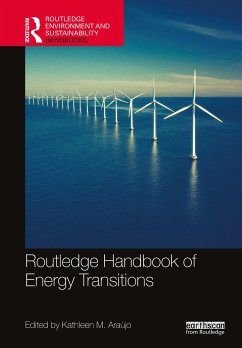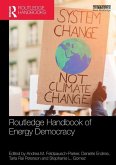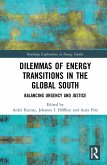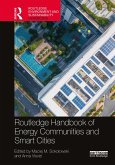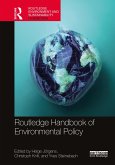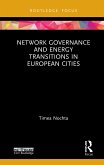The Routledge Handbook of Energy Transitions draws upon a unique and multidisciplinary network of experts from around the world to explore the expanding field of energy transitions.
This Handbook recognizes that considerable changes are underway or are being developed for the modes in which energy is sourced, delivered, and utilized. Employing a sociotechnical approach that accounts for economics and engineering, as well as more cross-cutting factors, including innovation, policy and planning, and management, the volume considers contemporary ideas and practices that characterize the field. The book explores pressing issues, including choices about infrastructure, the role of food systems and materials, sustainability, and energy democracy. Disruption is a core theme throughout, with the authors examining topics such as digitalization, extreme weather, and COVID-19, along with regional similarities and differences. Overall, the Routledge Handbook of Energy Transitions advances the field of energy transitions by connecting ideas, taking stock of empirical insights, and challenging how we think about the theory and practice of energy systems change.
This innovative volume functions as an authoritative roadmap with both regional and global relevance. It will be an essential resource for students, policymakers, researchers, and practitioners researching and working in the fields of energy transitions, planning, environmental management and policy, sustainable business, engineering, science and technology studies, political science, geography, design anthropology, and environmental justice.
The Handbook was awarded Best Edited Book About Energy by the American Energy Society "What stands out in this Handbook is its sociotechnical examination of the considerable changes in which energy is sourced, delivered, and utilized."
Chapter 26 of this book is freely available as a downloadable Open Access PDF at http://www.taylorfrancis.com under a Creative Commons [Attribution-Non Commercial-No Derivatives (CC-BY-NC-ND)] 4.0 license.
Chapter 10 of this book is freely available as a downloadable Open Access PDF at http://www.taylorfrancis.com under a Creative Commons [Attribution-Non Commercial-No Derivatives (CC-BY-NC-ND)] 4.0 license.
This Handbook recognizes that considerable changes are underway or are being developed for the modes in which energy is sourced, delivered, and utilized. Employing a sociotechnical approach that accounts for economics and engineering, as well as more cross-cutting factors, including innovation, policy and planning, and management, the volume considers contemporary ideas and practices that characterize the field. The book explores pressing issues, including choices about infrastructure, the role of food systems and materials, sustainability, and energy democracy. Disruption is a core theme throughout, with the authors examining topics such as digitalization, extreme weather, and COVID-19, along with regional similarities and differences. Overall, the Routledge Handbook of Energy Transitions advances the field of energy transitions by connecting ideas, taking stock of empirical insights, and challenging how we think about the theory and practice of energy systems change.
This innovative volume functions as an authoritative roadmap with both regional and global relevance. It will be an essential resource for students, policymakers, researchers, and practitioners researching and working in the fields of energy transitions, planning, environmental management and policy, sustainable business, engineering, science and technology studies, political science, geography, design anthropology, and environmental justice.
The Handbook was awarded Best Edited Book About Energy by the American Energy Society "What stands out in this Handbook is its sociotechnical examination of the considerable changes in which energy is sourced, delivered, and utilized."
Chapter 26 of this book is freely available as a downloadable Open Access PDF at http://www.taylorfrancis.com under a Creative Commons [Attribution-Non Commercial-No Derivatives (CC-BY-NC-ND)] 4.0 license.
Chapter 10 of this book is freely available as a downloadable Open Access PDF at http://www.taylorfrancis.com under a Creative Commons [Attribution-Non Commercial-No Derivatives (CC-BY-NC-ND)] 4.0 license.
The Handbook was awarded Best Edited Book About Energy by the American Energy Society "What stands out in this Handbook is its sociotechnical examination of the considerable changes in which energy is sourced, delivered, and utilized."
"Most studies on energy transitions emphasize the need for non-fossil fuels to solve the current problems of the world's energy problems. This book gives a refreshingly broader view: an energy transition with innovation and changes of behavior as key factors".
Professor José Goldenberg, University of Sao Paulo, Brazil; Lead Author for the World Energy Assessment and Co-Chair of the Global Energy Assessment
"This is an important book for those interested in the crucial aspect of the energy transition to a decarbonized economy. As climate change has become a threat multiplier for global insecurities, we need to move as rapidly as possible, informed by sound analysis such as what these authors provide, to transition our energy systems".
Sherri Goodman, Secretary General, International Military Council on Climate
and Security; Vice Chair, Secretary of State's International Security Advisory Board; Formerly, First Deputy Undersecretary of Defense, Environmental Security, United States
"This timely reference should come as a welcome relief to any policymaker, investor, or practitioner trying to navigate the complex energy transition now underway - a transition we have no choice but to accelerate. Many useful blueprints can be drawn from its comprehensive coverage of topics, and the crosscutting way they're presented".
Mark Radka, Chief, Energy and Climate Branch, Economy Division, United Nations Environment Programme
"This volume provides a comprehensive overview of all aspects of the ongoing energy transition. It provides an excellent introduction for students and practitioners alike".
Jim Skea, Professor of Sustainable Energy, Centre for Environmental Policy, Imperial College, United Kingdom; IPCC Working Group III Chair
"The great energy transition of the 21st century is well underway - and it is accelerating. Those of us working in the field hope to see by mid-century a fundamentally new global energy system built on a backbone of renewable energy. Understanding this transition is key to realizing this vision and this work provides a critical view from a multidisciplinary perspective addressing the economic, policy, innovation, and management aspects of the energy transition".
Katherine Dykes, Head of Section, Systems Engineering and Optimization, DTU Wind Energy, Technical University of Denmark
"Energy transitions are frequently mentioned but poorly understood, with too much focus on utopian technical perspectives without considering the wider socio-economical and philosophical impacts that will affect all communities. This Handbook helps to address this imbalance through careful curation to provide a comprehensive overview of the essential aspects needing to be considered when devising energy policies and assessing their effectiveness. The Handbook should be essential reading for everyone who wants to enable just and effective energy transitions for all".
Martin Young, Former Senior Director, World Energy Council
"Humanity needs to do something unprecedented: foster a complete transformation of a vital technological infrastructure in less than a decade. And not just any infrastructure, but the world's energy system. Routledge Handbook of Energy Transitions sets a foundation for everyone to better understand the choices in all aspects of the challenge, making it a must-read".
Greg Unruh, Arison Chair in Values Leadership; Associate Professor, Sustainable Business Strategy and Social Innovation, George Mason University; Strategic Partner of the United Nations Global Compact
"With considerable accumulated expertise, Dr. Araújo has produced important international work on energy transitions. The Routledge Handbook of Energy Transitions continues this tradition. This book highlights regional energy insights from Latin America, Europe, Asia, Africa, Australia, and North America, with valuable takeaways for global energy policies. More broadly, this Handbook brings attention to diverse aspects of energy transitions, primarily triggered by the necessity of the increasing use of low-carbon energy sources. As such, this book serves as a valuable reference for energy researchers and policymakers".
Jose R. Moreira, Senior Professor at the Institute of Energy and Environment, University of Sao Paulo, Sao Paulo, Brazil; Lead Author, IPCC Special Report, Methodological and Technological Issues in Technology Transfer
"This Routledge Handbook of Energy Transitions is a guide to the ongoing transformations taking place and the possible pathways to an - as yet - unrealized low-carbon energy future. Each of the proposed technological options is covered comprehensively and authoritatively. Of equal importance is the attention given to the requirements for an accompanying economic and societal transition that will eventually stabilize atmospheric CO2 and other greenhouse gases at concentrations that avoid dangerous anthropogenic interference with the climate system. As this volume makes clear, the transition to wondrous low-carbon technologies can and must be affordable and acceptable to individuals and societies. This is a recommended reading for anyone wanting to understand energy transitions".
Bill Moomaw, Member, National Advisory Board for the Union of Concerned Scientists; Chair of the Board of Climate Group North America; Professor Emeritus of International Environmental Policy, the Fletcher School, Tufts University
"A timely resource that goes beyond the obvious topics to illuminate the links between energy system transformation and other key policy domains, including food systems, equity concerns, trade, and macroeconomic stability".
Stephen Hammer, Adviser, Global Partnerships and Strategy, World Bank
"Most studies on energy transitions emphasize the need for non-fossil fuels to solve the current problems of the world's energy problems. This book gives a refreshingly broader view: an energy transition with innovation and changes of behavior as key factors".
Professor José Goldenberg, University of Sao Paulo, Brazil; Lead Author for the World Energy Assessment and Co-Chair of the Global Energy Assessment
"This is an important book for those interested in the crucial aspect of the energy transition to a decarbonized economy. As climate change has become a threat multiplier for global insecurities, we need to move as rapidly as possible, informed by sound analysis such as what these authors provide, to transition our energy systems".
Sherri Goodman, Secretary General, International Military Council on Climate
and Security; Vice Chair, Secretary of State's International Security Advisory Board; Formerly, First Deputy Undersecretary of Defense, Environmental Security, United States
"This timely reference should come as a welcome relief to any policymaker, investor, or practitioner trying to navigate the complex energy transition now underway - a transition we have no choice but to accelerate. Many useful blueprints can be drawn from its comprehensive coverage of topics, and the crosscutting way they're presented".
Mark Radka, Chief, Energy and Climate Branch, Economy Division, United Nations Environment Programme
"This volume provides a comprehensive overview of all aspects of the ongoing energy transition. It provides an excellent introduction for students and practitioners alike".
Jim Skea, Professor of Sustainable Energy, Centre for Environmental Policy, Imperial College, United Kingdom; IPCC Working Group III Chair
"The great energy transition of the 21st century is well underway - and it is accelerating. Those of us working in the field hope to see by mid-century a fundamentally new global energy system built on a backbone of renewable energy. Understanding this transition is key to realizing this vision and this work provides a critical view from a multidisciplinary perspective addressing the economic, policy, innovation, and management aspects of the energy transition".
Katherine Dykes, Head of Section, Systems Engineering and Optimization, DTU Wind Energy, Technical University of Denmark
"Energy transitions are frequently mentioned but poorly understood, with too much focus on utopian technical perspectives without considering the wider socio-economical and philosophical impacts that will affect all communities. This Handbook helps to address this imbalance through careful curation to provide a comprehensive overview of the essential aspects needing to be considered when devising energy policies and assessing their effectiveness. The Handbook should be essential reading for everyone who wants to enable just and effective energy transitions for all".
Martin Young, Former Senior Director, World Energy Council
"Humanity needs to do something unprecedented: foster a complete transformation of a vital technological infrastructure in less than a decade. And not just any infrastructure, but the world's energy system. Routledge Handbook of Energy Transitions sets a foundation for everyone to better understand the choices in all aspects of the challenge, making it a must-read".
Greg Unruh, Arison Chair in Values Leadership; Associate Professor, Sustainable Business Strategy and Social Innovation, George Mason University; Strategic Partner of the United Nations Global Compact
"With considerable accumulated expertise, Dr. Araújo has produced important international work on energy transitions. The Routledge Handbook of Energy Transitions continues this tradition. This book highlights regional energy insights from Latin America, Europe, Asia, Africa, Australia, and North America, with valuable takeaways for global energy policies. More broadly, this Handbook brings attention to diverse aspects of energy transitions, primarily triggered by the necessity of the increasing use of low-carbon energy sources. As such, this book serves as a valuable reference for energy researchers and policymakers".
Jose R. Moreira, Senior Professor at the Institute of Energy and Environment, University of Sao Paulo, Sao Paulo, Brazil; Lead Author, IPCC Special Report, Methodological and Technological Issues in Technology Transfer
"This Routledge Handbook of Energy Transitions is a guide to the ongoing transformations taking place and the possible pathways to an - as yet - unrealized low-carbon energy future. Each of the proposed technological options is covered comprehensively and authoritatively. Of equal importance is the attention given to the requirements for an accompanying economic and societal transition that will eventually stabilize atmospheric CO2 and other greenhouse gases at concentrations that avoid dangerous anthropogenic interference with the climate system. As this volume makes clear, the transition to wondrous low-carbon technologies can and must be affordable and acceptable to individuals and societies. This is a recommended reading for anyone wanting to understand energy transitions".
Bill Moomaw, Member, National Advisory Board for the Union of Concerned Scientists; Chair of the Board of Climate Group North America; Professor Emeritus of International Environmental Policy, the Fletcher School, Tufts University
"A timely resource that goes beyond the obvious topics to illuminate the links between energy system transformation and other key policy domains, including food systems, equity concerns, trade, and macroeconomic stability".
Stephen Hammer, Adviser, Global Partnerships and Strategy, World Bank

